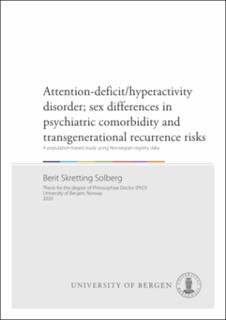| dc.contributor.author | Solberg, Berit Skretting | en_US |
| dc.date.accessioned | 2020-02-13T14:04:21Z | |
| dc.date.available | 2020-02-13T14:04:21Z | |
| dc.date.issued | 2020-02-07 | |
| dc.date.submitted | 2020-01-09T14:03:21.705Z | |
| dc.identifier | container/b6/f8/bc/c1/b6f8bcc1-b0fa-4393-889f-4fd7c111c9db | |
| dc.identifier.isbn | 9788230864500 | en_US |
| dc.identifier.isbn | 9788230868713 | en_US |
| dc.identifier.uri | https://hdl.handle.net/1956/21409 | |
| dc.description.abstract | Background: Attention-deficit/hyperactivity disorder (ADHD) is a heterogeneous, multifactorial and life-spanning neurodevelopmental disorder for which the underlying mechanisms and causes are not fully understood. Psychiatric comorbidity is common, but there is limited knowledge about sex differences and patterns of comorbidity in adults with ADHD. Likewise, ADHD is known to be highly heritable, but little is known about sex patterns in the transgenerational recurrence risks of ADHD, both for parents and offspring. Gaining more knowledge about these topics will increase the understanding of ADHD both from clinical and neurobiological perspectives. Aims: This thesis is based on three scientific papers with the following main aims; 1) investigate potential sex differences in the risk of comorbid psychiatric disorders in adults with ADHD compared with adults without; 2) investigate patterns of psychiatric comorbidities between adults with ADHD, ASD, both ADHD and ASD, and adults without these disorders, and evaluate these patterns in light of available genetic data, and 3) investigate the parent-offspring recurrence risk of ADHD by parental and offspring sex. Material and methods: Data from four nation-wide registries were linked and were the main basis for all the papers: The Medical Birth Registry of Norway (MBRN), the Norwegian Patient Registry (NPR), the Norwegian Prescription Database (NorPD), and the National Educational Database (NED). The NPR (2008-2015) and NorPD (2004-2015) provided ADHD information. Papers I and II included only adults, born 1967-1997, and the outcomes were psychiatric disorders (anxiety, depression, bipolar, personality, substance use, and schizophrenia spectrum disorder). Effect measures were determined by Poisson regression and evaluated both on the absolute and the relative scales in all three papers. For paper II, genetic correlations were also calculated by linkage disequilibrium score regression, exploiting summary statistics from relevant genome-wide association studies. In paper III, all individuals born 1967-2011 and their parents were identified using the MBRN, and transgenerational recurrence risks for mothers and fathers to offspring were calculated. Additionally, individuals born 1967-1968 were followed to 2011 and linked to any own children to evaluate the cumulative reproduction and the age at first childbirth in men and women with and without ADHD. Age at first childbirth was then taken into account when re-calculating recurrence risks in men born 1967-69 and women born 1970-73. Results: Adults with ADHD had a 4-9 times higher prevalence of other psychiatric disorders than adults without ADHD. Compared to men and women without ADHD, the differences in prevalence of anxiety, depression, bipolar and personality disorders were significantly larger in women than in men, whereas the prevalence difference of schizophrenia and substance use disorder were significantly larger in men than in women. When using prevalence ratios, the sex patterns were opposite. Risks differed between ADHD and ASD for all psychiatric comorbidities. Risks were highest in individuals with ADHD and ADHD+ASD for most comorbidities, both in men and women. Genetic correlations supported these patterns. Regarding transgenerational recurrence risk of ADHD, mothers with ADHD showed stronger associations with offspring ADHD than fathers, and recurrence risks were higher in female offspring than in male offspring from either parent. Prevalence of offspring ADHD when both parents had ADHD was 41.5% in sons and 25.1% in daughters. Men diagnosed with ADHD had lower cumulative reproduction than women with ADHD (75.2% versus 90.4%, respectively) and were generally older at childbirth. Conclusions: Psychiatric comorbidities are frequent in adults with ADHD but differ significantly between men and women. Adults with ADHD, ASD or the combination, have specific patterns of psychiatric comorbidities, and differed by sex. Stronger ADHD recurrence risk from mothers than fathers could be due to stronger maternal genetic effects, a stronger effect of maternal non-transmitted alleles, maternal health-seeking behavior, or a combination. | en_US |
| dc.language.iso | eng | eng |
| dc.publisher | The University of Bergen | eng |
| dc.relation.haspart | Paper I: Solberg BS, Halmøy A, Engeland A, Igland J, Haavik J, Klungsøyr K. Gender differences in psychiatric comorbidity: a population-based study of 40 000 adults with attention deficit hyperactivity disorder. Acta Psychiatr Scand 2018: 137: 176–186. The article is available in the thesis file. The article is also available at: <a href="http://hdl.handle.net/1956/19224" target="blank">http://hdl.handle.net/1956/19224</a>. | en_US |
| dc.relation.haspart | Paper II: Solberg BS, Zayats T, Posserud MB, Halmøy A, Engeland A, Haavik J, Klungsøyr K. Patterns of psychiatric comorbidity and genetic correlations provide new insights into differences between attention-deficit/hyperactivity disorder and autism spectrum disorder. Biol Psych 2019: 86 (8): 587-598. The article is available in the thesis file. The article is also available at: <a href="http://hdl.handle.net/1956/20697" target="blank">http://hdl.handle.net/1956/20697</a>. | en_US |
| dc.relation.haspart | Paper III: Solberg BS, Hegvik TA, Halmøy A, Engeland A, Haavik J, Klungsøyr K. Parent-offspring recurrence of attention-deficit/hyperactivity disorder. The article is not available in the thesis file. | en_US |
| dc.rights | Attribution-NoDerivs (CC BY-ND) | eng |
| dc.rights.uri | https://creativecommons.org/licenses/by-nd/4.0/ | eng |
| dc.title | Attention-deficit/hyperactivity disorder; sex differences in psychiatric comorbidity and transgenerational recurrence risks : A population-based study using Norwegian registry data | en_US |
| dc.type | Doctoral thesis | |
| dc.date.updated | 2020-01-09T14:03:21.705Z | |
| dc.rights.holder | Copyright the Author. | |
| dc.contributor.orcid | https://orcid.org/0000-0002-0168-1675 | |
| fs.unitcode | 13-14-0 | |

